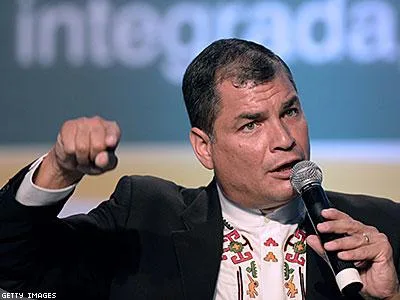Investors feeling bullish on Ecuador despite drop in oil prices; country plans to repay principal on maturing issues for the first time
By David Scigluizzo
Ecuador bonds have defied the slump in oil prices with a solid rebound, and this year the sovereign could pay principal on one of its maturing global issues for the first time ever.
The turnabout is nothing short of remarkable for a country that underwent a selective default just six years ago, and has investors feeling bullish about its ability to withstand the oil shock, at least in the short term.
Ecuador bonds are already among the best-performing sovereign issues in the EM universe, up 7.1% so far this year compared with a 1.4% gain for the JP Morgan EMBI Global Diversified index.
In a region where fellow oil producer Venezuela has seen its bonds lose more than 10% in just a matter of weeks and over 45% in the last six months, hopes are running high that Ecuador will soon be able to put its rocky history in the capital markets safely behind it.
“The government has been trying very hard to prove their willingness to pay,” said Sarah Glendon, sovereign economist at Gramercy.
“This is why repaying the 2015 bond is very symbolic for the government and the market.”
Ecuador has defaulted on every Global bond it has issued since debuting in the international markets in 1997 – but its $650 million 9.375% maturing in December could mark the turning point.
The note was the only one spared by President Rafael Correa when he opted in 2008 to default on the sovereign’s 2012s and 2030s, even though it had enough funds to service the debt.
CAUTIOUS OPTIMISM
The default decision helped solidify Correa’s reputation with investors as another market-hostile leader in the mold of late Venezuelan leader Hugo Chavez.
But the country has labored since then to win back market confidence, and was even able to issue a $2 billion 10-year bond last year at a yield of 7.95%, after attracting $5.1 billion in demand.
“Correa is no Chavez,” said John Baur, a portfolio manager at Boston-based investment management firm Eaton Vance.
“You certainly expect growth to be lower because oil prices are lower, and they are being hurt by a strong dollar, but I think the situation is manageable,” he said. “Ecuador is a buying opportunity.”
And with investors trimming their exposure to Venezuela due to that country’s woes, Ecuador offers an attractive bit of yield for what is seen as significantly lower risk.
“If you run a portfolio that is underweight the energy sector, and you become more comfortable with the outlook for oil prices, then buying Ecuador could be a good idea,” said Marcela Meirelles, Latin America credit analyst at TCW.
CHALLENGES REMAIN
For a country that relies on oil for more than 50% of exports and around 20% of public revenues, of course, adjusting to lower crude prices will likely require painful cuts to government spending and investment, the main drivers of Ecuador’s 5% average GDP growth over the past five years.
But Correa’s government has taken a proactive approach to falling oil revenue, announcing a 4% budget cut last month. The market welcomed the move, though many say official revenue projections are still too optimistic.
“Looking at the big picture, I think the government has largely underestimated its funding requirement for 2015, and we could see further supply down the road,” said Meirelles.
The government looks to rely heavily on bilateral loans from China to finance a large chunk of this year’s financing needs, but some say a return to the capital markets should not be ruled out – especially if oil prices rebound or spreads compress.
While a credit event is still considered unlikely in the short term, a prolonged deterioration in oil prices could have severe long-term consequences.
“It is beyond 2015 that I become more concerned,” said Glendon.
“If oil prices remain low, the economy could enter into recession. If that occurs, the main risk over the medium term is that the economy could be de-dollarised.”
For now, though, the country’s credit trajectory is improving. The sovereign is rated B3/B+/B, after Moody’s in December became the last of three main agencies to put it in single B range.
Those with a longer market memory will recall that Ecuador has only been boosted to single B status twice before in its nearly two decades in the international capital markets.
On both occasions, it defaulted shortly thereafter.
Credit: IFR Magazine, www.ifr-magazine.com





















